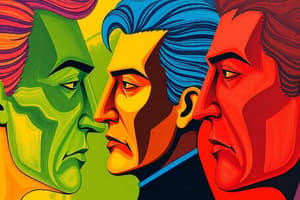Podcast
Questions and Answers
Who defined power as getting someone to do something they would not have done otherwise?
Who defined power as getting someone to do something they would not have done otherwise?
- Antonio Gramsci
- Robert Dahl (correct)
- Talcott Parsons
- Hannah Arendt
Which theorist compared power to money, suggesting that power circulates in society like currency in the economy?
Which theorist compared power to money, suggesting that power circulates in society like currency in the economy?
- Robert Dahl
- Talcott Parsons (correct)
- Hannah Arendt
- C.B. MacPherson
Who argued that power tends to corrupt, and absolute power corrupts absolutely?
Who argued that power tends to corrupt, and absolute power corrupts absolutely?
- Foucault
- Steven Lukes
- Lord Acton (correct)
- Antonio Gramsci
Which theorist distinguished between 'extractive power' and 'developmental power'?
Which theorist distinguished between 'extractive power' and 'developmental power'?
Who viewed power as a structural arrangement that shapes people's perceptions to maintain domination without observable conflict?
Who viewed power as a structural arrangement that shapes people's perceptions to maintain domination without observable conflict?
Study Notes
Definitions of Power
- Power is the ability to get someone to do something they wouldn't have done otherwise, as described by Robert Dahl.
- Power is like currency in politics, as it circulates in society, according to Talcott Parsons.
- Hannah Arendt views power as the ability to create action in a group through communication to achieve a public goal.
The Dark Side of Power
- Lord Acton states that power tends to corrupt, and absolute power corrupts absolutely.
- Michel Foucault sees power as a means of normalization and subjection through governable identities.
Power Dynamics
- Antonio Gramsci's concept of power is cultural hegemony, where one group dominates others.
- Steven Lukes views power as a structural arrangement that shapes people's perceptions to perpetuate domination without conflict.
Types of Power
- C.B. MacPherson distinguishes between extractive power (power over others) and developmental power (the ability to fulfill one's own goals).
- Extractive power involves getting others to do something, while developmental power involves achieving one's own self-appointed goals.
Studying That Suits You
Use AI to generate personalized quizzes and flashcards to suit your learning preferences.
Description
This quiz covers different definitions of power in politics, including views from Robert Dahl, Talcott Parsons, Hannah Arendt, and Lord Acton.




